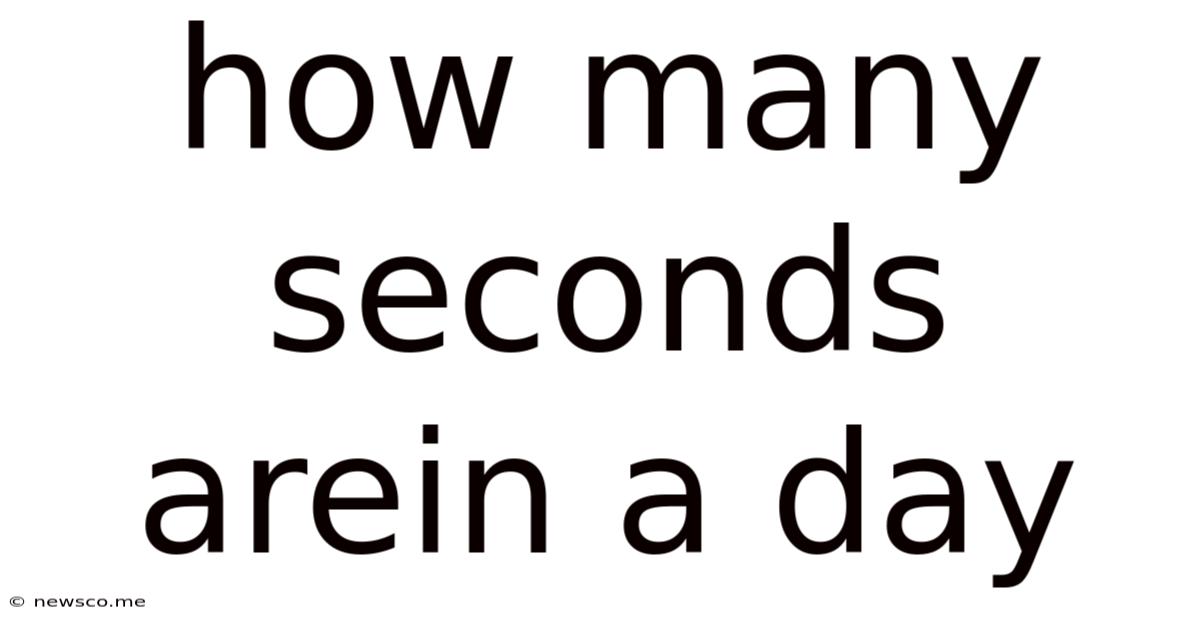How Many Seconds Arein A Day
News Co
Apr 03, 2025 · 4 min read

Table of Contents
How Many Seconds Are in a Day? A Deep Dive into Time Calculation
Knowing how many seconds are in a day might seem like a trivial question, but understanding the calculation reveals a fascinating insight into the structure of time measurement and its implications across various fields. This article will not only answer the question directly but will explore the underlying concepts, provide variations based on different contexts, and demonstrate its practical applications.
The Simple Answer: 86,400 Seconds
The straightforward answer is 86,400 seconds. This is derived from the standard 24-hour day, with 60 minutes in each hour and 60 seconds in each minute. The calculation is:
24 hours/day * 60 minutes/hour * 60 seconds/minute = 86,400 seconds/day
Decoding the Calculation: Units of Time
Understanding the calculation requires appreciating the hierarchical structure of time units. We commonly use the following units:
- Second: The base unit of time in the International System of Units (SI).
- Minute: 60 seconds.
- Hour: 60 minutes (or 3600 seconds).
- Day: 24 hours (or 86,400 seconds).
- Week: 7 days.
- Month: Varies depending on the calendar system (approximately 30.44 days).
- Year: Approximately 365.25 days (accounting for leap years).
The consistent relationship between these units (60 seconds in a minute, 60 minutes in an hour) stems from the sexagesimal numeral system, a base-60 system used by ancient civilizations like the Babylonians. While the origins are debated, its adoption for time measurement has endured for millennia.
Beyond the Basic Calculation: Variations and Considerations
While 86,400 seconds is the standard calculation, certain contexts might require adjustments:
Leap Seconds
The Earth's rotation is not perfectly constant. To account for slight variations, leap seconds are occasionally added to Coordinated Universal Time (UTC), the primary time standard. These adjustments ensure that UTC remains aligned with solar time. Therefore, on days with a leap second, there are 86,401 seconds. However, these are infrequent and announced well in advance.
Different Calendars
Different cultures have employed various calendar systems throughout history. While most modern societies use the Gregorian calendar, calculations of seconds in a day would remain consistent regardless of the specific calendar used, as the fundamental relationship between seconds, minutes, and hours remains constant.
Time Zones
Time zones do not affect the number of seconds in a day. While the local time might differ across regions, the total number of seconds within a 24-hour period remains constant globally. The Earth rotates once per day, and this rotation dictates the passage of 86,400 seconds (excluding leap seconds).
Applications of the 86,400-Second Calculation
The knowledge of 86,400 seconds in a day has numerous practical applications across diverse fields:
Scientific Research:
- Astronomy: Astronomers use precise timekeeping to track celestial events and movements, requiring accurate calculations based on seconds.
- Physics: Experiments often involve precise timing measurements, relying on the fundamental unit of the second.
- Environmental Science: Monitoring environmental changes often involves continuous data collection over time, necessitating calculations in seconds.
Technology and Engineering:
- Software Development: Software programs rely on precise timing for various functions, from scheduling tasks to handling real-time events.
- Computer Systems: The operation of computer systems relies on highly accurate clocks, measured in seconds and fractions thereof.
- Robotics: Robotics systems frequently require precise timing for coordinated movements and actions.
Finance and Business:
- High-Frequency Trading: High-speed trading algorithms rely on incredibly precise timing to execute transactions, making accurate calculations in seconds essential.
- Data Analysis: Analyzing financial data often involves examining trends and patterns over time, needing precise calculations.
- Project Management: Project management often involves breaking down tasks into small time units, sometimes even into seconds for certain highly precise projects.
Everyday Life:
- Scheduling: Effectively managing your time, from daily routines to complex schedules, implicitly incorporates an understanding of the passage of seconds and their accumulation.
- Productivity: Many productivity techniques are based on working in focused bursts, frequently measured in minutes and seconds.
- Sports: Sporting events use time as a critical factor, relying on precise timing to determine winners and record achievements.
Beyond the Numbers: The Significance of Time
The question of "how many seconds are in a day" transcends a simple mathematical problem. It touches upon our understanding of time, its measurement, and its pervasive influence across various aspects of our lives. The precise quantification of time, down to the second, has driven technological advancements, scientific discoveries, and improvements in various aspects of human endeavor.
Conclusion: Mastering Time Management
Understanding the 86,400 seconds in a day is not just about a numerical fact; it's about appreciating the value of time and how we can effectively utilize it. By appreciating this fundamental unit of time, we can improve our productivity, make informed decisions, and better navigate the complexities of daily life. Whether in scientific research, technological advancement, or our personal lives, the precise measurement and effective management of time are crucial to success and fulfillment. The seemingly simple question of how many seconds are in a day opens up a profound discussion about the nature of time and its impact on our world.
Latest Posts
Related Post
Thank you for visiting our website which covers about How Many Seconds Arein A Day . We hope the information provided has been useful to you. Feel free to contact us if you have any questions or need further assistance. See you next time and don't miss to bookmark.